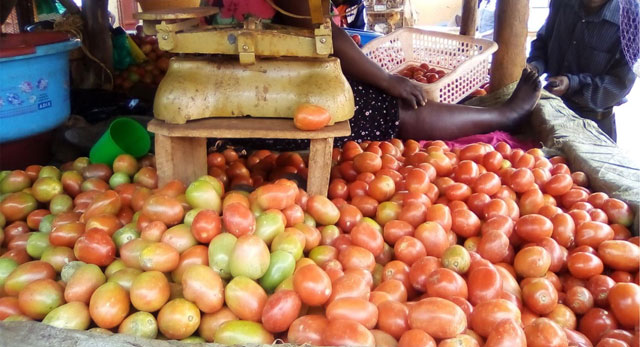
Kampala, Uganda | THE INDEPENDENT | Agricultural experts have tasked the government to employ stringent measures to regulate the importation, supply, and use of dangerous pesticides for agricultural productivity citing its dangers to food safety.
The concerns come amidst reports of high levels of pesticide residues being detected in fresh vegetables and water sources which is threatening food security and human health.
Last week, the Uganda National Association of Community and Occupational Health (UNACOH) in its survey report revealed that selected districts in northern Uganda had a higher proportion of pesticide residues in vegetables and water sources than other regions.
The survey report was conducted between 2018 and 2019 in selected 41 market stalls, and 30 farms, using 355 tomato samples in 18 districts in Eastern, Western, Central, and Northern Uganda.
Presenting the report during a stakeholder’s engagement in Gulu City, Aggrey Atuhaire, a crop, and Pesticide Safety specialist at UNACOH says the survey report paints a grim picture of food safety.
He says tests conducted confirmed eight different pesticide residues in all the tomatoes tested with the highest being 1.4 mg of Mancozeb, a fungal pesticide that exceeded the Codex Maximum Residue Limits for Pesticides.
Other pesticides found during the research included Dichlorvos, chlorpyrifos 0.0002mg, metalaxyl 0.0019mg, Lambda-cyhalothrin 0.0058 mg, cypermethrin 0.00392mg, profenofos 0.0394 mg, and Malathion 0.0818 mg.
According to the report, unpeeled fresh tomatoes presented high concentrations of pesticides at 29 percent beyond the Codex Maximum Residue Limits for Pesticides. Tomatoes washed with cold and warm water on the other hand presented with six and three percent pesticide residue concentrations respectively.
However, the report showed the pesticide residue concentration on tomatoes from markets in Nebbi, Gulu, Adjumani, and Kitgum districts exceeded other regions.
A separate study conducted on water samples in 86 water points in 17 districts across the country also painted a worrying picture of water safety in the country.
The study found 94.2 percent (81 out of 86) water sources selected had at least one detectable Pesticide residue.
For instance, in Paicho Sub-county, Kal Ali Parish, Gulu District one of the areas where the study was conducted, researchers found six different pesticides in three wells and one borehole. The highest concentration was Glyphosate pesticide, a common herbicide used by farmers.
Overall, the study indicated a total of 13 different pesticide residues were detected from 18 water points in the districts of Kitgum, Adjumani, Nebbi, and Gulu, the highest compared to Eastern, Central, and Western regions.
The pesticides included Glyphosate, Dichlorvos, profenofos, 2,4-D, chlorfenivinphos, diazinon, cypermethrin, chlorpyrifos, metalaxyl, Aziphos-ethyl, Bendiocarb, carbofuran, and dimethoate.
Atuhaire says that the unregulated distribution and supply of chemical pesticides across the country is a great risk to food safety for millions of consumers.
He notes that whereas the government passed the Agricultural chemical control act of 2006, there are a lot of gaps in its implementation.
The act which came into use in April 2007 seeks to control and regulate the manufacture, storage, distribution, and trade in, use, importation, and exportation of agricultural chemicals and other related matters.
Atuhaire says there is a need for the government to enforce stringent regulations on the importation, distribution, and use of agrochemicals and public awareness of pesticide safety.
Last week Uganda joined the rest of the world to commemorate World Food Safety Day globally marked to draw attention and inspire action to help prevent, detect, and manage foodborne risks.
Smallholder farmers in the country under the Eastern and Southern Africa Small Scale Farmers Forum (ESAFF- Uganda) however tasked the government to strengthen the implementation of agricultural policies and practices.
They also observed the need for the adoption of agro-ecological practices in extension services to spread awareness of potential threats to the health of people and the environment which in turn will safeguard both consumers and farmers from consuming harmful food.
“Through improving the relationship between plants, animals, soil, people, and the environment, agroecology emerges as the most sustainable approach to production, encouraging the use of less harmful inputs. In turn, this enhances and restores the ecosystem’s functionality, ensuring food and nutrition security.” Says Masudio Margaret, the Publicity Secretary, of ESAFF Uganda.
As of 2020, the government had approved 41 highly hazardous Pesticides (HHP) for use by farmers in the country. The majority of the pesticides (59 percent) are however not approved for use in the European Union (EU) countries.
According to the FAO, around 600 million people, or nearly 1 in 10 people worldwide, get sick after eating contaminated food, and 420 000 people pass away each year.
****
URN
 The Independent Uganda: You get the Truth we Pay the Price
The Independent Uganda: You get the Truth we Pay the Price


